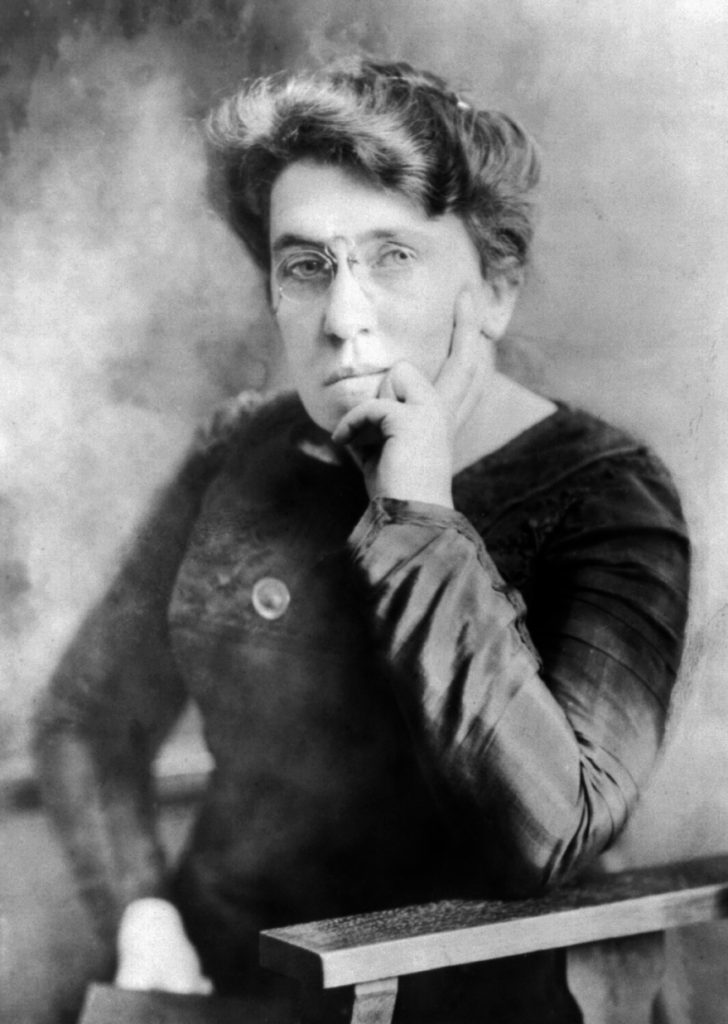Winner of the Spring 2017 StMU History Media Awards for
Best Article in the Category of “Gender History”
Emma Goldman, who would later in life be a known anarchist and women’s rights activist, had a very dismal beginning to life. Emma Goldman was born on June 27, 1869 in Kaunas, Lithuania, which was then known as Kovno, Lithuania. The dynamic of the family was unique as well, as Emma had two older sisters who were born from her mother, Taube Binowitz Zodikow, from her first marriage. Taube’s first husband and father to her two eldest daughters, Helena and Lena, passed away leaving Taube a widow. From this death, Taube entered into an arranged marriage with Abraham Goldman, resulting in the birth of Emma. During Emma’s childhood, she endured beatings from her father frequently, and her mother offered her no comfort. With this constant abuse and no support, Emma felt no sense of security in her household. This brought Emma into being raised with relatives in Königsberg, Germany. But in time Emma returned to the house of her parents Taube and Abraham, as being raised by the relatives in Germany was, if anything, worse by Emma’s standards, as she endured further neglect and abuse. But shortly after returning to her parents, they all moved to Königsberg, Germany, where Emma was luckily able to attend school. While she attended school in Germany, she became close friends with a teacher who gave her a first look into a new world she had never known of before. Music and literature came into Emma’s life and both proved to be lifelong loves of hers.1

Emma’s life took a drastic turn in 1881, when her family decided to move again, this time to St. Petersburg, Russia. In Russia, the Goldmans suffered financially and because of this drawback, Emma could no longer attend school. Money aside, her father did not support Emma’s schooling, as he believed there was no need for a woman to have any schooling. Emma’s love for learning and hope of becoming a doctor had been shattered right in front of her, yet she still remained on a path like no other. She became rebellious of her father’s ideals and his cultural traditions, including the Jewish faith. Emma Goldman had become introduced to the ideas of radicalism and she became further knowledgeable on a wider variety of subjects. A main source of inspiration for Emma was reading Nikolay Chernyshevsky’s novel What Is to Be Done? A character in the novel, Vera Pavlovna, gave inspiration and hope to Emma. Emma’s father had begun arranging for her to be married, but as Emma read of Vera’s idea that “rejected this practice as it is the auctioning of a sex object,” Emma, too, became a strong believer in rejecting arranged marriages.2
Emma was in despair at the life she had set out before her, so in 1885, she and her sister Helena moved to the United States. While Emma hoped for a new world to open up for her in Rochester, New York, her hopes were not met. Her parents had followed her and her sister to the United States, and more talk of an arranged marriage was still being discussed. Emma felt trapped. She was still subject to nearly the same low-paying factory work that she had wished to escape by coming to America.3
Then inspiration struck Emma Goldman once again. She had read about the four men who had been executed for the 1886 bombings that had killed several people in Haymarket Square in Chicago. Emma believed that these men had been executed because they were merely suspected of being anarchists, and that there was no proof that they had actually been the ones who had thrown the bombs. This enraged Emma, as she saw this as an injustice brought upon these men. Emma saw a clear parallel in the way the United States was behaving toward radicals and the way Russia also dealt with radicals. With this fuse lit, Emma became a companion to those who opposed capitalism and the state.4
Emma Goldman, now living in New York’s Lower East Side, became acquainted with two men: Johann Most, the editor of the anarchist newspaper Die Freiheit (Freedom), and Alexander Berkman, a known anarchist figure in the United States. Emma came to see the idea of Anarchism as a “promised society based on judgement and reason.”5

Emma Goldman opposed the idea that corporations and states should hold all of the power and control in society. Schooled on Johann Most’s teachings on anarchism, Emma took to public speaking. In 1890, Emma was elated to find how effective she was at inspiring others. Emma spoke in both Yiddish and German, and one of her driving purposes was to provoke change in workers’ working conditions. She spoke of how miserable life was for these workers, working for companies with managers that saw them as merely interchangeable parts in a big machine.6
In time Emma became a natural speaker, and she branched out into discussing even more topics. She began to speak out about women in a way that had rarely been vocalized in public. She became an advocate for sexual and reproductive freedom for women. By 1900, birth control was becoming more openly discussed in public, and this discussion of birth control drew criticism. Many viewed discussing birth control in public as being obscene and indecent, and some women were even punished for speaking about this “indecency.” Emma Goldman let her voice be heard in this area, and she began to address larger and larger crowds. The more concerns she brought to her listeners’ attention, the more ears she attracted. She was a woman, center stage, and this made her stand out even more, as men could not speak so personally and intimately on this issue as she could.7

One thing limiting Goldman’s audiences was her choice in addressing them in German and Yiddish. When she began addressing them in English, she attracted even more listeners, and from a wider variety of backgrounds as well. With this growth in popularity, her name also became known to the police. They attempted to silence Emma, and even sentenced her to a full year in prison in 1893 for doing nothing more than speaking at a rally for the unemployed. This arrest did not silence Goldman, as she exclaimed that these government authorities “can never stop a woman from talking.”8 This year of detainment put no damper on Goldman’s goals, as she swore her life to teaching the principles of anarchism, and foremost to encourage others to question authority. To make matters worse for Emma’s standing, the population at large believed that anarchists were simply provoking senseless violence, as seen in the assassination attempt on Henry Clay Frick in 1892 by Emma’s close friend, Alexander Berkman, and the actual assassination of President William McKinley in 1901, who was shot by anarchist Leon Czolgosz. Goldman did not want this image of anarchism to be the accepted image, and she continued to speak openly in defense of anarchism. To make matters even worse, Goldman, who had been acquainted with Czolgosz, was being held in police custody for her supposed involvement in the assassination of McKinley. She was detained for two weeks before her release, as no evidence was found linking her to the crime.9

She continued to lecture, but with each arrival she did not know whether an arrest was imminent, or if she would simply be locked out of the premises she was meant to speak in. As the United States entered World War I, Emma Goldman’s lectures were seen as a threat to national security. After spending eighteen months in prison, she faced immediate deportation to Russia. Back in Russia, Goldman found herself practically and completely miserable. Her anarchist ideas were not accepted in Leninist Russia, and she felt betrayed and rejected. And now Emma faced another hatred: antisemitism. Emma was now being viewed and looked at solely because of her Jewish background. With the rise of anti-semitism came another threat: totalitarianism. Goldman saw this threat and took action. She now began to lecture on totalitarianism, and how she identified it in the forms it had been taking in Italy and Germany.10
“The most violent element in society is ignorance.”
Emma Goldman could not escape the title people gave her as being just another “Jewish woman.” Criticism came to her because of this and she even stated, “life was linked with that of the race.”11 On the contrary, Emma Goldman kept her head up. Candace Falk says Emma envisioned herself as “a woman who could transcend the boundaries imposed by the stereotypical social constructions of religion.”12 Emma would express herself through written word as time progressed. Nearing the last few years of her life, in 1937, Emma showed her concern even more for the striking rise of Nazism. Emma took to writing about this now because of her shock in learning about Adolf Hitler and all that he proposed. She wanted to exclaim how she had fought so hard for the right of a good life for the Jewish community, and she wanted to emphasize how Jewish culture was not to be annihilated, but appreciated for its contributions. She dreaded the future that was to come, and she urged the need for countries to take in Jewish refugees. Only three years later, in 1940, Emma Goldman unfortunately died from a stroke in Toronto, Canada where she lived in hopes that she would be allowed to visit the United States.13

Emma Goldman stood up for many things throughout her life, and did not hide her voice from the crowd. She persevered, she never gave up on her ideas and beliefs. She stood up for those who needed to be heard and she did not apologize for it. She was feared, and she was adored. She, in herself, is a symbol of free expression and through this she wanted people to follow in her footsteps. She wished for a better world for those who were oppressed. She wanted a world where women were looked at as being more than their physical bodies. She fought for equality and she fought for fair treatment. Emma Goldman was a woman who was not afraid to speak when so many tried to silence her.
- Salem Press Biographical Encyclopedia, 2008, s.v. “Emma Goldman,” by Lloyd J. Graybar. ↵
- Salem Press Biographical Encyclopedia, 2008, s.v. “Emma Goldman,” by Lloyd J. Graybar. ↵
- Salem Press Biographical Encyclopedia, 2008, s.v. “Emma Goldman,” by Lloyd J. Graybar. ↵
- Salem Press Biographical Encyclopedia, 2008, s.v. “Emma Goldman,” by Lloyd J. Graybar. ↵
- Jewish Women’s Archive, March 2009, s.v. “Emma Goldman,” by Candace Falk. ↵
- Jewish Women’s Archive, March 2009, s.v. “Emma Goldman,” by Candace Falk. ↵
- Jewish Women’s Archive, March 2009, s.v. “Emma Goldman,” by Candace Falk. ↵
- Jewish Women’s Archive, March 2009, s.v. “Emma Goldman,” by Candace Falk. ↵
- Jewish Women’s Archive, March 2009, s.v. “Emma Goldman,” by Candace Falk. ↵
- Jewish Women’s Archive, March 2009, s.v. “Emma Goldman,” by Candace Falk. ↵
- Emma Goldman, Living My Life (New York: Alfred A. Knopf, 1931), 704. ↵
- Jewish Women’s Archive, March 2009, s.v. “Emma Goldman,” by Candace Falk. ↵
- Jewish Women’s Archive, March 2009, s.v. “Emma Goldman,” by Candace Falk. ↵



124 comments
Iris Reyna
Wow! Good job on the article Gabriela and congruent on winning the spring 2017 award in your category. The article was very informative and educational and was put together nicely. I’d never heard of Emma Goldman before today. She was a brave and powerful woman of her time. She suffered so much at the hands of her own family but she never stop striving for what she wanted. It’s a true inspiration to learn of all the topics that she believed like anarchism, women’s rights, and many other topics. Goldman never gave up and never cowered away, she was truly something else.
Rosalyn Ledesma
Wonderful article, it is truly worthy of its award! I think it’s so inspiring that she advocated for everything she believed in, despite being constanly critisized and even being sentenced to jail. I really loved the quote you put in after that, “they can never stop a woman from talking.” There is nothing like reading about strong, empowering women that fought for other strong women. I think we need more people like Emma Goldman, or strive to be like her.
Jacob Anthony Ayala
This was a great read! I really enjoyed learning about Emma Goldman and how she became “the most dangerous woman in America”. Learning that she was dangerous because her speaking influence was extremely interesting to read. When she was first sent to jail and came back with “the government can never silence a woman”. That’s such a great line and something that was very true to her and how we’ve evolved today as a society.
Nnamdi Onwuzurike
It’s easy to see why this article won the award. I never knew about Emma Goldman in the past but after reading this article, I feel well-informed about her. It’s always sad to see a parent abuse and neglect their child and because she wasn’t able to have that welcoming aura at home, she found it elsewhere. I love her determination to keep speaking up despite being locked up for a long period of time and looked down upon for her gender and race.
Bryon Haynes
Emma Goldman was a character I never heard about prior to reading, but I find her story crucial and highly underrepresented. Rising from a childhood of abuse and trauma, Emma solidified herself as a voice for the justice she desperately wanted. Despite the initial language barrier and imprisonment meant to silence her, nothing truly deterred her from reaching her goals and that on its own is iconic.
Guiliana Devora
This is a very inspiring story to all, not just women. I love the fact that she stood up for what she believed in and did not let anyone try to tell her she could not, not even her own family. Her beliefs did go against public view at the time like birth control, and it is crazy to see how birth control was so frowned upon and now it is boosted in today’s society. I like how the author told her story and made it to where I would want to keep reading.
Isabel Soto
This article was very informative because it is the voice for the women.she wanting to make a difference in the world and voice her opinion. Later in the article she was the voice of the jewish community.she was a inspiring for the women community to voice their opinion . The title of the article very caught me and it was totally worth it.
Maria Luevano
Gabriela, congratulations on the award! This was definitely an award-winning read! Before this article, I had never heard of Emma Goldman. It is always great to read about a strong female character in history, especially regarding women’s rights and freedoms. It is crazy to think women could be punished for speaking out about their bodies, but not much has changed since then. Women’s sexual and reproductive rights are still under attack, but I am glad to have read about a woman like Emma Goldman who was brave enough to speak out about her beliefs and opinions.
Lyle Ballesteros
This is a really good and interesting story about a women I had never heard of but seemingly had a very important impact of American aociety in the early 1900’s and was one of the early progressives in an era where more people and women in particular were gaining a bigger voice and want for freedom of expression, to vote, and have equal rights to men. She was also an advocate against antisemitism in Europe and around the world during a time where antisemitism was growing by the year and being Jewish in Europe was becoming more dangerous. She was very brave and not afriad to speak her mind and atand by her morals and ideals which is something we have seen from many progressives since and hope to continue.
Madison Magaro
Congratulations on winning best article for gender history! This article did a great job on writing about how Emma Goldman fought for stuff that she believed in and kept on fighting when people were trying to stop her. Even after getting put in jail for a year, as soon as she went out she continued to advocate for what she believed in. Goldman is an inspiration for all women to stand up for what they believe in.